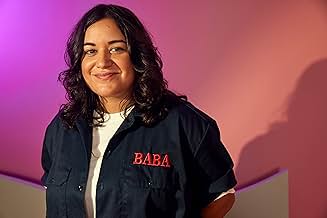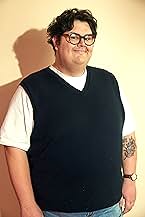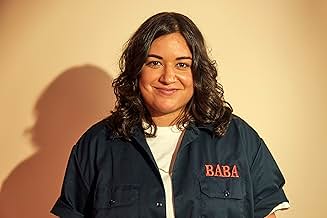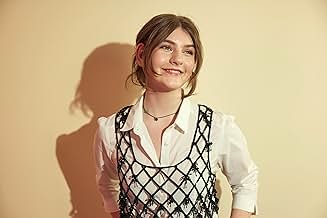PUNTUACIÓN EN IMDb
6,4/10
4,2 mil
TU PUNTUACIÓN
Sam, una cómica que lucha contra el trastorno de estrés postraumático, sopesa si unirse o no a la búsqueda de una adolescente desaparecida a la que solía cuidar.Sam, una cómica que lucha contra el trastorno de estrés postraumático, sopesa si unirse o no a la búsqueda de una adolescente desaparecida a la que solía cuidar.Sam, una cómica que lucha contra el trastorno de estrés postraumático, sopesa si unirse o no a la búsqueda de una adolescente desaparecida a la que solía cuidar.
- Premios
- 8 nominaciones en total
Reseñas destacadas
Ally Pankiw's feature debut "I Used to be Funny" competently explores fragile experiences of depression and PSTD, recovering from assault, and child endangerment with a tame dose of fragile drama, sprinkled with witty humour.
Pankiw's choice to present the story through sequencing between Sam's mission to find a missing Brooke, the young girl she nannied, and frequent flashbacks of memories of the two's once-close bond. While the concept of a non-linear narrative is meant to efficiently expand the dynamics and pasts of the characters and their journeys, which it technically achieves for the majority of the film. The beginning of this sequence felt static as the vague nature that shrouded the connection between Sam, her trauma, and her past with Brooke, overstayed its welcome in the first third of the story. However, the pace thankfully accelerates once the first clues of Brooke's disappearance are uncovered.
Some elements of the film at times, lean too hard into melodrama that lacks actual substance, especially in the vague and unmoving first third of the film. Cuts to some flashbacks that felt somewhat cliche a script that at times felt too expository, and perhaps two-too-many Phoebe Bridgers needle drops; tools that ask the audience to engage with the characters and the mysterious tragedy that haunts them. These elements may have been appropriate in the context of a television episode, considering Pankiw's background in TV direction, but unfortunately fell flat within a full-length feature film.
Amidst these faults, one of the film's greatest strengths is its talented cast. Rachel Sennott's has not only cemented herself as a star of off-beat and relatable comedy but also demonstrated a striking capacity for performances filled with intense vulnerability, harmoniously embodying all relevant elements of the tragicomedy genre. Her ability to foster chemistry with the rest of the cast only adds further dimension to the sorrow and humor that defines her character's journey.
Overall, I Used to Be Funny poses an intimate image of how trauma can take control of our lives and sense of self-worth. While bleak, the potential for healing is also presented as the empathetic and hopeful conclusion to Sam and Brooke's journey. While the film's approach at times lacks the ingenuity and impact it clearly intended to bring, it remains that Pankiw's strength lies in how she stays firm with the difficult themes and issues she addresses.
Pankiw's choice to present the story through sequencing between Sam's mission to find a missing Brooke, the young girl she nannied, and frequent flashbacks of memories of the two's once-close bond. While the concept of a non-linear narrative is meant to efficiently expand the dynamics and pasts of the characters and their journeys, which it technically achieves for the majority of the film. The beginning of this sequence felt static as the vague nature that shrouded the connection between Sam, her trauma, and her past with Brooke, overstayed its welcome in the first third of the story. However, the pace thankfully accelerates once the first clues of Brooke's disappearance are uncovered.
Some elements of the film at times, lean too hard into melodrama that lacks actual substance, especially in the vague and unmoving first third of the film. Cuts to some flashbacks that felt somewhat cliche a script that at times felt too expository, and perhaps two-too-many Phoebe Bridgers needle drops; tools that ask the audience to engage with the characters and the mysterious tragedy that haunts them. These elements may have been appropriate in the context of a television episode, considering Pankiw's background in TV direction, but unfortunately fell flat within a full-length feature film.
Amidst these faults, one of the film's greatest strengths is its talented cast. Rachel Sennott's has not only cemented herself as a star of off-beat and relatable comedy but also demonstrated a striking capacity for performances filled with intense vulnerability, harmoniously embodying all relevant elements of the tragicomedy genre. Her ability to foster chemistry with the rest of the cast only adds further dimension to the sorrow and humor that defines her character's journey.
Overall, I Used to Be Funny poses an intimate image of how trauma can take control of our lives and sense of self-worth. While bleak, the potential for healing is also presented as the empathetic and hopeful conclusion to Sam and Brooke's journey. While the film's approach at times lacks the ingenuity and impact it clearly intended to bring, it remains that Pankiw's strength lies in how she stays firm with the difficult themes and issues she addresses.
IUTBF is a tough movie to love. I guess you would have to live in the disillusioned LA Gen Z bubble to understand any of the characters or their motivations. Cinema is best defined as an empathy creating machine but this movie made me feel nothing.
The issue is mostly the awkward, stilted conversations in the screenplay. The opaque plot doesn't help. The flashback scenes provide some drama but also make the whole film seem like a Greek tragedy.
The direction is actually fairly effective, the acting, however, is not. Some of the characters will be grating to a 'normal' audience. Hence the need for the bubble.
I never thought that a movie about a stand up comic could be so laugh free.
The issue is mostly the awkward, stilted conversations in the screenplay. The opaque plot doesn't help. The flashback scenes provide some drama but also make the whole film seem like a Greek tragedy.
The direction is actually fairly effective, the acting, however, is not. Some of the characters will be grating to a 'normal' audience. Hence the need for the bubble.
I never thought that a movie about a stand up comic could be so laugh free.
I found the description of this movie to be deceptive. The story is about a former comedian where something happened that derailed her life.
The description says PSTD but what this trauma event is it not immediately revealed. The movie spends the three quarters of the time dancing around something having happened.
The dialog tries to be hip about teenage topics but it is mostly just cringe. No cap.
Much of the story is told as flash backs interweaved into the present so such it's never really clear when anything is occurring until several beats into a scene. I found this all irritating and bad story telling.
The movie eludes to what may have happened and while it's possible to guess, it's makes it all the worse that they don't just say it.
Everyone in the movie knows what happened but we are left out of being shared the details. Conversations about the event happen over and over to the point of becoming fraying, like an inside joke that no one will explain to you until you start to wonder if the pay off will be worth it.
It won't.
This fake tension is bad story telling. There is a missing child and the description creates a narrative that this is a big part of the movie but it's simply not. Our main character spends most of the movie unconcerned about the child's whereabouts. Its only purpose is to provide an ending to an otherwise meandering mess of a movie.
The description says PSTD but what this trauma event is it not immediately revealed. The movie spends the three quarters of the time dancing around something having happened.
The dialog tries to be hip about teenage topics but it is mostly just cringe. No cap.
Much of the story is told as flash backs interweaved into the present so such it's never really clear when anything is occurring until several beats into a scene. I found this all irritating and bad story telling.
The movie eludes to what may have happened and while it's possible to guess, it's makes it all the worse that they don't just say it.
Everyone in the movie knows what happened but we are left out of being shared the details. Conversations about the event happen over and over to the point of becoming fraying, like an inside joke that no one will explain to you until you start to wonder if the pay off will be worth it.
It won't.
This fake tension is bad story telling. There is a missing child and the description creates a narrative that this is a big part of the movie but it's simply not. Our main character spends most of the movie unconcerned about the child's whereabouts. Its only purpose is to provide an ending to an otherwise meandering mess of a movie.
Comedy is inherent in calling on personal experiences for a joke. Humor is a defense mechanism and a willing tool to break the ice and even recover. Comedy is healing and is used significantly in the film I Used To Be Funny. In a somewhat dark comedy set against the backdrop of the #MeToo era, the film stars Rachel Sennott as a struggling comic battling PTSD who takes part in a search for a missing girl she used to nanny. The film tackles heavy subject matter with airy deftness, and what ties it together is Sennott's arresting performance. In an edgy and humorous film, I Used To Be Funny takes center stage as one of the year's best.
Full review @ Geek Vibes Network.
Full review @ Geek Vibes Network.
As a person who has also experienced trauma, I've often wondered - how would I ever approach writing a book or movie about my experiences, and honestly the way this movie used flashbacks did resonate with me.
I can understand how some might feel it's disjointed, but honestly that's sometimes how living with PTSD, depression, etc. Feels like.
I know some people complained that it's not funny, I guess I didn't expect it to be laugh out loud funny based on the description - it literally includes PTSD in the description and is called "I used to be funny" - i.e. She doesn't feel funny anymore.
Overall, I appreciated the storytelling.
I can understand how some might feel it's disjointed, but honestly that's sometimes how living with PTSD, depression, etc. Feels like.
I know some people complained that it's not funny, I guess I didn't expect it to be laugh out loud funny based on the description - it literally includes PTSD in the description and is called "I used to be funny" - i.e. She doesn't feel funny anymore.
Overall, I appreciated the storytelling.
¿Sabías que...?
- CuriosidadesDirector Ally Pankiw was dating Muna member Naomi McPherson during the production of the film, but have since broken up. Naomi is still second to the top of special thanks during credits, and two Muna songs feature during the film.
Selecciones populares
Inicia sesión para calificar y añadir a tu lista para recibir recomendaciones personalizadas
- How long is I Used to Be Funny?Con tecnología de Alexa
Detalles
Taquilla
- Recaudación en Estados Unidos y Canadá
- 171.756 US$
- Fin de semana de estreno en EE. UU. y Canadá
- 29.499 US$
- 9 jun 2024
- Recaudación en todo el mundo
- 171.756 US$
- Duración1 hora 45 minutos
- Color
- Relación de aspecto
- 2.00 : 1
Contribuir a esta página
Sugerir un cambio o añadir el contenido que falta

Principal laguna de datos
What is the Canadian French language plot outline for Antes era divertido (2023)?
Responde


























